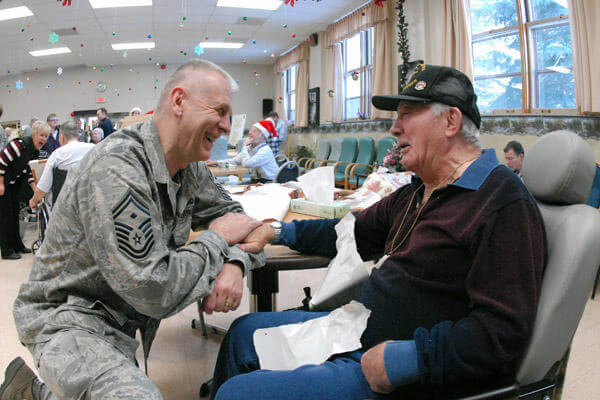The Department of Veterans Affairs is planning to expand several programs that allow senior veterans to age in their homes or live in home-like settings as alternatives to elder care facilities.
VA officials announced Monday they will expand the Home-Based Primary Care and Veteran-Directed Care programs, which provide medical care and caregiver services to housebound older veterans, and its Medical Foster Home program, which provides housing and services to veterans who otherwise would be in nursing homes.
The expansion is needed, said officials with the VA's Office of Geriatrics and Extended Care, to ensure that the department can support a growing number of veterans eligible for nursing home care.
By 2039, the number of elderly veterans is expected to double from 2 million to 4 million.
"These evidence-based programs allow veterans to age-in-place, avoid or delay nursing home placement and choose the care environment that aligns most with their care needs, preferences and goals," said Dr. Scotte Hartronft, the office's executive director, in a press release.
Since 1999, the Department of Veterans Affairs has been required to provide nursing home services to veterans who qualify for VA health care and have a service-connected disability rating of 70% or higher, or are considered unemployable and have a disability rating of 60% or higher.
This care is provided through short- or long-term nursing home facilities, respite care, VA community living centers, private assisted living facilities, state veterans homes and the Medical Foster Home program.
Medical foster homes are places where veterans live full time in a home setting with a caregiver licensed to provide 24-hour support, meals, housing, help with daily living and companionship.
The program places veterans in houses belonging to or managed by caregivers that are licensed by their states as assisted-living facilities.
To be eligible for the program, veterans must be enrolled in VA health care and have a complex disabling medical condition that requires coordination of care across VA services and is severe enough to need a nursing home level of care.
Because medical foster homes are not considered institutional care, the VA cannot pay the cost directly. The veterans can use their VA disability compensation, Social Security income and savings to pay the cost, which covers room and board and support.
The VA has faced challenges increasing the number of Medical Foster Homes because of the rigorous regulations and requirements of the facilities and caregivers.
The process for becoming a home provider is rigorous: They must pass a federal background check, complete 80 hours of initial training and 20 hours of additional training each year, and maintain certifications in first aid, CPR and administering medications.
Home caregivers must live on-site, are required to provide around-the-clock supervision and care for their veterans, and have relief staff for when they go on vacation or need to conduct other business.
Veterans in the Medical Foster Care program must also use the VA's Home-Based Primary Care program, which provides a team of health professionals to treat veterans in their homes. A VA study found that this type of home-based care yielded a 31% reduction in hospital admissions for veterans in the program and 59% drop in VA in-patient hospitalization days.
VA officials said that more veterans have elected to use the in-home medical care and caregiver programs during the pandemic, as well as the Medical Foster Care program, to reduce their risk of contracting COVID-19 and to have more flexibility in medical treatment.
"Veterans using these programs have experienced fewer hospitalizations and emergency department visits, reduced hospital and nursing home days and fewer nursing home readmissions and inpatient complications," Hartronft said.
More information on these programs is available at the VA's Office of Geriatrics and Extended Care website.
– Patricia Kime can be reached at Patricia.Kime@Military.com. Follow her on Twitter @patriciakime
Related: Veterans Choose Medical Foster Home Program Instead of a Nursing Home














